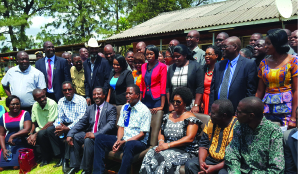
• President Edgar Lungu (seated fourth right) and Michael Nguluta (seated fourth left) with others pose for a picture.
By HUMPHREY NKONDE –
KITWE’S Mukuba Boys’ Secondary School has produced President Edgar Lungu and other professionals who have contributed to the development of Zambia in many ways.
One of the technocrats in Government from the Kitwe-based school is Michael Musonda Nguluta, the head of the Ndola College of Biomedical Sciences, which is located within the premises of Ndola Central Hospital.
In fact, when President Lungu visited his former school on November 2, 2015, Mr Nguluta gave a vote of thanks and posed with the Head of State for a group picture.
Mr Nguluta has made valuable contributions in the laboratory circles, among them being the creation of the Ndola College of Biomedical Sciences, which started as the School of Medical Laboratory Sciences in March 1973.
In this regard, he was recently awarded a certificate of appreciation by the Biomedical Society of Zambia for his valuable contribution towards the development of biomedical sciences in Zambia.
The first intake of 18 students at Ndola School of Biomedical Sciences was in 2001 and to date, 462 students have since graduated and are serving various medical institutions in the country.
SCHOOL DAYS
Mr Nguluta, who was born in 1956 in Kitwe, has done several courses including biomedical sciences, management in public health, teaching methodology and leadership, was at Mukuba Boys’ Secondary School in the 1970s.
He was at the Kitwe-based school because his father used to work for Nkana Mine.
After completing his secondary school education, Mr Nguluta did a diploma in medical laboratory sciences from 1978 to 1980 at Lusaka’s Evelyn Hone College.
He then worked at Kabwe Mine Hospital, which was run by the Zambia Consolidated Copper Mines (ZCCM), a mining conglomerate that was established by first President Kenneth Kaunda’s government.
After obtaining a higher national certificate in medical laboratory sciences from John Moores University in Liverpool the United Kingdom (UK), Mr Nguluta was promoted to the position of chief laboratory technologist, a title he held until Kabwe Mine Hospital was handed to Government.
Before he was seconded to the ministry of Health following the dissolution of ZCCM, Mr Nguluta obtained a Bachelor of Science degree in medical sciences from Dublin University in Ireland.
BIOMEDICAL SCHOOL
Under Mr Nguluta’s leadership, the creation of the Ndola College of Biomedical Sciences has been rated as one of the most successful projects in international development in Africa under the Irish Aid.
In 1999, Government approved upgrading the certificate course at the then School of Medical Laboratory Sciences to a diploma level to be offered by the Ndola School for Biomedical Sciences.
The new college’s foundation stone was laid by John Neville, who was then Charge d’Affaires of the Irish Embassy in Zambia based in Lusaka.
The college was officially opened on December 2, 1999 by Enock Kavindele, who was then minister of Health under President Frederick Chiluba’s Movement for Multiparty Democracy (MMD) government.
“The Irish Government through the Development Co-operation Ireland (DCI) in partnership with the Zambian Government, through the ministry of Health funded the construction of infrastructure,” says a statement that has been obtained from the college.
International assistance from the Irish Aid did not end with the construction of the college, but also included provision of training materials, laboratory equipment, furniture and training of lecturers.
The first stage regarding the construction of the college included the erection of the administration block incorporating the director’s office, secretary’s office, accounts, a classroom, audiovisual room, seminar room and two laboratories.
In the second stage, developments included construction of the lecture theatre, a classroom, computer room library, two laboratories and a hostel for female students.
STAFF DEVELOPMENT
After the certification was upgraded to the diploma level, the Irish Aid sponsored staff development projects through degree programmes.
Mr Nguluta was the first member of staff from the Ndola Biomedical Sciences to study for a degree at Dublin Institute of Technology.
“I studied microbiology at the Dublin Institute of Technology from 1998 to 2000,” Mr Nguluta said in an interview after he was honoured for developing biomedical sciences in Zambia.
Several other members of staff were engaged to pursue other core branches of biomedical sciences including cellular pathology, haematology and clinical chemistry.
All members of staff were who were trained in Ireland did so under full sponsorship by the Irish Aid.
Besides sponsoring the degree programmes, the Irish Aid extended its financial assistance to the college by sponsoring the academic staff for a teaching methodology course from Luanshya’s Teachers Vocation Training College (TVTC).
The number of members to staff who undertook development programmes and benefitted from the Irish Aid stands at 17 and it is from these fruits that biomedical students at Ndola Biomedcal College and beyond are benefitting from.
“The Ndola School of Biomedical Sciences has eight full time academic staff specialised in cellular biology, clinical biochemistry, medical microbiology, medical parasitology haematology and blood transfusion,” Mr Nguluta explained.
However, supporting modules which are prerequisites for the core subjects are handled by guest lecturers from Ndola Central Hospital, Arthur Davison Hospital, Northern Technical College and Tropical Diseases Research Centre which is another institution located at Ndola Central Hospital.
FACILITIES AND FUTURE
The Ndola College of Biomedical Sciences has four state-of-the-art laboratories, Internet, library and a lecture theatre.
Other facilities include a seminar room, audiovisual room, computer laboratory and a building for continued professional development.
It is now a requirement that people working in various departments in Government institutions must have higher education including first and higher degrees.
This is the route that the Ndola School of Biomedical Sciences would like to take by introducing a degree course in the future, according to Mr Nguluta’s vision.
Some of the lecturers at the Ndola School of Biomedical Sciences hold masters degrees and are therefore capable of offering courses at degree level.
The author is resident correspondent for the African Independent, acontinental newspaper published in Johannesburg, South Africa.






